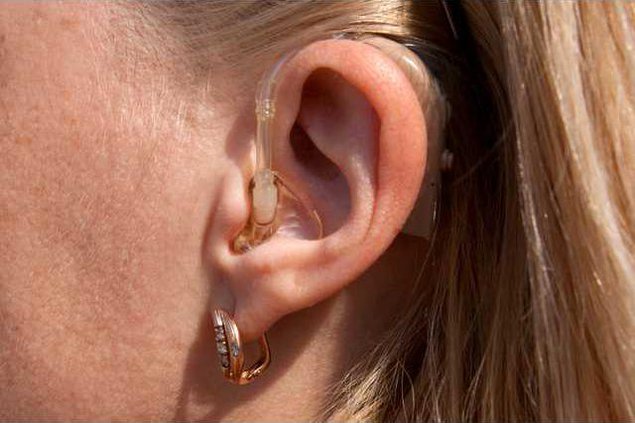After a little nudging from his wife, 59-year-old Mike Stocking found himself at the audiologist office.
"I would always say don't talk to me in this ear, I can't hear you as well as this one here. She kept telling me you need to get your ears checked," Stocking said.
Stocking originally was not interested in hearing aids, but his mindset quickly changed six months ago when he opted for the new high-tech wireless hearing aids with Bluetooth capability.
His audiologist, Dr. Michael Walker, explained how they work and the benefits, "You can route phone calls directly from your cellphone through your hearing aids. The neat thing is you're hearing it in both ears and it's converted to your hearing loss."
Stocking said he just uses an app. "You get the app and (snap) you're just that fast and I'm not very smart with smartphones, but it was quick to put it on there," said Stocking.
Dr. Walker makes all the settings specific to Mike's hearing loss. Stocking can then make quick and easy adjustments for different environments, like restaurants and other noisy situations.
Stocking drives tractor trailers nearly 500 miles every day, hearing the hum of the highway. His new aids are music to his ears. He can now hear people talking 100 feet away, and then there are the little things that Stocking didn't know he was missing. "I can hear myself walking on carpet barefoot," said Stocking.
Dr. Walker says the stigma attached to hearing aids is long gone and increasing communication with the hard of hearing helps everyone. "If you're cut off from society, like a hearing loss would do that, you are unable to communicate with your family, your friends and a lot of times people will be isolated," said Walker.
The hearing aids help get rid of the isolation factor Walker said and increase the quality of life.
These new hearing aids are smaller size. They are also more comfortable and Stocking proudly shows them off, he said, "The benefit far outweighs not having the negative to me."
These new high-tech hearing aids do not come cheap. You can expect to pay about $4,000 to $7,000 a pair. Some insurance does cover it, and some audiologists allow patients to try them first before purchasing.
"I would always say don't talk to me in this ear, I can't hear you as well as this one here. She kept telling me you need to get your ears checked," Stocking said.
Stocking originally was not interested in hearing aids, but his mindset quickly changed six months ago when he opted for the new high-tech wireless hearing aids with Bluetooth capability.
His audiologist, Dr. Michael Walker, explained how they work and the benefits, "You can route phone calls directly from your cellphone through your hearing aids. The neat thing is you're hearing it in both ears and it's converted to your hearing loss."
Stocking said he just uses an app. "You get the app and (snap) you're just that fast and I'm not very smart with smartphones, but it was quick to put it on there," said Stocking.
Dr. Walker makes all the settings specific to Mike's hearing loss. Stocking can then make quick and easy adjustments for different environments, like restaurants and other noisy situations.
Stocking drives tractor trailers nearly 500 miles every day, hearing the hum of the highway. His new aids are music to his ears. He can now hear people talking 100 feet away, and then there are the little things that Stocking didn't know he was missing. "I can hear myself walking on carpet barefoot," said Stocking.
Dr. Walker says the stigma attached to hearing aids is long gone and increasing communication with the hard of hearing helps everyone. "If you're cut off from society, like a hearing loss would do that, you are unable to communicate with your family, your friends and a lot of times people will be isolated," said Walker.
The hearing aids help get rid of the isolation factor Walker said and increase the quality of life.
These new hearing aids are smaller size. They are also more comfortable and Stocking proudly shows them off, he said, "The benefit far outweighs not having the negative to me."
These new high-tech hearing aids do not come cheap. You can expect to pay about $4,000 to $7,000 a pair. Some insurance does cover it, and some audiologists allow patients to try them first before purchasing.








